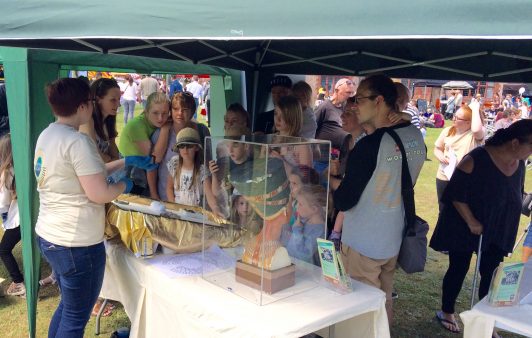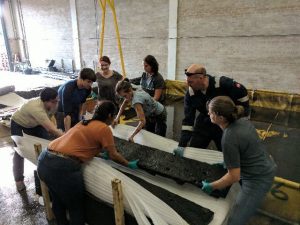The Significance of Volunteering in the Heritage Sector
6 February 2018
Have you ever wandered around a historic landmark and marveled at the landscaping? Or wondered how often those statues in the museum have to be dusted and who does it? Have you ever walked into a small, local museum and noted how few ‘staff’ are present, or asked why it’s only open a few days a month? While there are many factors that affect all of these questions there is a common denominator: volunteering. Volunteers are essential to the heritage sector: whether they are front of house greeters, preventive conservation monitors, docents, or gardeners, they share the responsibility for keeping heritage alive.

No matter what a person’s day job or background is, anyone can share their love for the sector by volunteering. For example, a diverse group of volunteers meets at the Pontypridd Museum every Wednesday. Women who grew up in Pontypridd and know all the local history work on the postcard collections; a history student from University of South Wales who is interested in how museums function inputs collections data into the new software system; conservation students from Cardiff University help sort through textiles and do condition assessments. Everyone brings a unique perspective that ultimately helps build a better understanding of the collection. At the same time, volunteering in the heritage sector gives each of these individuals a sense of pride and ‘ownership’ in the local community and heritage sites. In fact, some heritage sites are strictly volunteer run, such as Cowbridge Museum. Even though the museum is only open two days a month, the volunteers’ dedication to preserving local history recently helped the museum achieve accreditation.

For students, volunteering provides multiple benefits. Classroom learning can never truly replace real-world experience in any field. As conservation students, even our lab sessions provide an idealized version of museum work, with many more options available for treatments and analysis. Working within the more limited budget and resources of a historic house or small museum is an entirely different experience, and provides students with a chance to hone their skills in problem solving and decision-making. Being on-site also provides practical experience in project management, visitor interactions, and disaster planning/action. Students also gain hours of experience for CVs and make professional connections that are crucial when applying for jobs. Volunteering gives students a chance to build up practical experiences that, in addition to academic work, are vital for embarking on a successful career in the heritage sector.

My personal experience with volunteering in the heritage sector began after I finished my undergraduate degree in classics. I didn’t know what I wanted to do but I was leaning towards archaeology or museum work. I went to a local historic house, James Madison’s Montpelier, willing to work in either area. They needed help in the archaeology lab and so began a lifelong passion, though not in archaeology! While in the lab I was introduced to conservation. My interest and passion was recognized and I was encouraged to take on more conservation responsibilities. While investigating options for programs of study, I discovered Cardiff University. I wasn’t even aware of conservation as a career or even section of the heritage sector before I began volunteering. Volunteering at Montpelier and Pontypridd, and my summer placement in Bolton, rounded out my understanding of everything that goes into keeping museums of different sizes alive and running. My coursemates have had similarly rewarding experiences at the Smithsonian, the Museum of London, and other institutions across the UK.

Here at Cardiff University many of our students in the Conservation Department volunteer in a variety of places, from small local museums to the Glamorgan Archives, from helping with the Newport Ship to taking trips to London for historic house work. Each place has welcomed us with open arms and I have yet to visit a historic site or museum that does not appreciate their volunteers and welcome more. So even if you have a day job that has nothing to do with heritage, such as an accountant or IT specialist, but you have an interest, I urge you to volunteer in the Heritage Sector even if only for a few days at an event. You will enrich your life, and contribute an important service to your local museum and community.

Let us know about your experiences with volunteering in the comments!
Thank you to all who contributed photos and to Aliza Taft, editor-in-chief, for helping me translate thoughts into words.
- March 2024 (1)
- December 2023 (1)
- November 2023 (2)
- March 2023 (2)
- January 2023 (6)
- November 2022 (1)
- October 2022 (1)
- June 2022 (6)
- January 2022 (8)
- March 2021 (2)
- January 2021 (3)
- June 2020 (1)
- May 2020 (1)
- April 2020 (1)
- March 2020 (4)
- February 2020 (3)
- January 2020 (5)
- November 2019 (1)
- October 2019 (1)
- June 2019 (1)
- April 2019 (2)
- March 2019 (1)
- January 2019 (1)
- August 2018 (2)
- July 2018 (5)
- June 2018 (2)
- May 2018 (3)
- March 2018 (1)
- February 2018 (3)
- January 2018 (1)
- December 2017 (1)
- October 2017 (4)
- September 2017 (1)
- August 2017 (2)
- July 2017 (1)
- June 2017 (3)
- May 2017 (1)
- March 2017 (2)
- February 2017 (1)
- January 2017 (5)
- December 2016 (2)
- November 2016 (2)
- June 2016 (1)
- March 2016 (1)
- December 2015 (1)
- July 2014 (1)
- February 2014 (1)
- January 2014 (4)